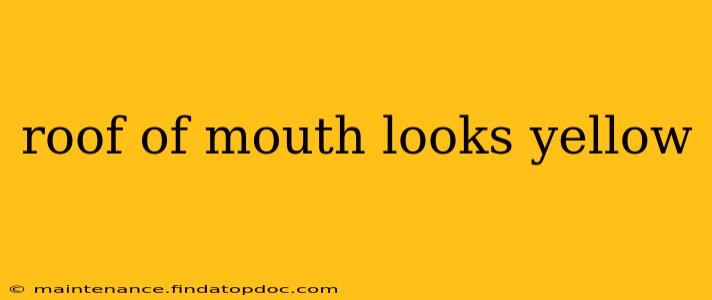A yellow roof of the mouth, or palate, can be alarming, but it's often a symptom of a relatively minor issue. However, understanding the possible causes is crucial to determining the appropriate course of action. This article will explore various reasons why your palate might appear yellow, offering insights into potential concerns and when professional medical advice is necessary.
What Causes a Yellow Roof of the Mouth?
Several factors can contribute to a yellow discoloration of the palate. These range from harmless temporary conditions to more serious underlying health problems. Let's explore some of the most common causes:
Dehydration:
One of the most common causes of a yellow roof of the mouth is dehydration. When you're dehydrated, your saliva production decreases, leading to a dry mouth. This dryness can concentrate pigments and bacteria, causing a yellowish tint. Increased fluid intake usually resolves this issue.
Smoking and Tobacco Use:
Smoking and chewing tobacco are significant contributors to yellowing of the mouth, including the palate. The nicotine and tar in tobacco products stain the soft tissues, leading to a yellow or even brownish discoloration. Quitting tobacco use is crucial for both oral and overall health.
Food and Drink:
Certain foods and drinks can temporarily stain the roof of your mouth. Curries, brightly colored candies, and even some juices can leave behind temporary yellowing. Good oral hygiene, including brushing and flossing, usually helps remove these stains.
Oral Hygiene:
Poor oral hygiene can lead to a buildup of plaque and bacteria, resulting in yellowing of the palate. Plaque harbors bacteria that produce pigments, contributing to discoloration. Regular brushing, flossing, and using mouthwash are vital for maintaining good oral health.
Medications:
Some medications can cause a dry mouth as a side effect, indirectly contributing to a yellow tinge on the palate due to the concentration of pigments and bacteria. If you suspect this is the case, consult your physician or pharmacist.
Jaundice:
A yellowing of the skin and whites of the eyes (jaundice) can sometimes manifest as a yellowing of the palate. Jaundice is a symptom of underlying liver problems, such as hepatitis or cirrhosis. If you experience jaundice along with a yellow roof of the mouth, seek immediate medical attention. This is a serious condition requiring prompt diagnosis and treatment.
Oral Thrush (Candidiasis):
Oral thrush is a fungal infection that can cause a yellow or white coating on the palate. This condition is often associated with weakened immune systems or the use of antibiotics. If the yellowing is accompanied by white patches or soreness, it’s essential to consult a doctor for diagnosis and treatment.
Other Medical Conditions:
In rarer cases, a yellow palate can be a symptom of other medical conditions, including certain types of anemia. A comprehensive medical evaluation is necessary to rule out these possibilities.
When Should I See a Doctor About a Yellow Roof of My Mouth?
While a yellow roof of the mouth is often harmless, it's crucial to seek medical attention if:
- The yellowing is accompanied by other symptoms, such as jaundice, fever, or significant pain.
- The discoloration persists despite good oral hygiene.
- You notice white patches or lesions on your palate.
- You have a weakened immune system.
- You're experiencing unexplained weight loss or fatigue.
Your doctor can perform a thorough examination and determine the underlying cause of the yellowing, providing appropriate treatment if needed.
How Can I Prevent a Yellow Roof of the Mouth?
Practicing good oral hygiene is paramount in preventing a yellow roof of the mouth:
- Brush your teeth twice a day with fluoride toothpaste.
- Floss daily to remove food particles and plaque between your teeth.
- Use mouthwash to help kill bacteria and freshen breath.
- Stay hydrated by drinking plenty of water throughout the day.
- Avoid smoking and tobacco use.
- Maintain a healthy diet.
- See your dentist regularly for checkups and cleanings.
By following these preventive measures, you can significantly reduce the risk of experiencing a yellow roof of the mouth and maintain optimal oral health. Remember, early detection and treatment are crucial for any health concerns, so don't hesitate to seek professional advice if you have any worries.
